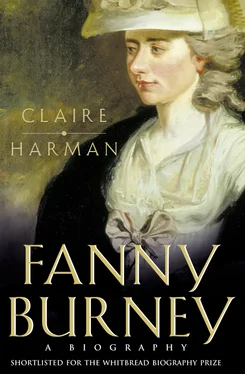*St Ann’s Blackfriars, Christ Church Greyfriars, and St Vedast and St Michael le Quern.
*The date at which Fanny’s maternal grandmother died is uncertain, and the paucity of references to her in Charles Burney’s memoirs and Fanny’s early diaries slightly puzzling. She was alive in 1764, when Charles Burney wrote to his daughter from Paris to ‘tell your grandmothers’ he had arrived safely, and dead by May 1775, when Fanny recalls in her diary how deeply she mourned for her. 27 The reference to ‘writing a Letter to my Grand mama Sleepe’ in July 1768 28 may be misleading, since the word ‘Sleepe’ has been recovered from Madame d’Arblay’s emendations to her manuscript, and is possibly a simple error. Fanny was in correspondence with her other grandmother, Ann Burney (who died in October 1775), in August 1768. 29
*Now part of Tavistock Street, Covent Garden.
*Which was demolished by the 1690s, but is still commemorated in the name of Great Windmill Street, off Shaftesbury Avenue.
*Pope remained her favourite poet, with Shakespeare, for life.
*It appears in her third novel, Camilla , when one of the characters, overheard reciting from it, is thought to be reading an illicit love-letter.
*I have used the Memoirs version rather than the slightly different one in Dr Burney’s fragmentary memoirs, which does not, for instance, include the detail of the tub of water being there for the shrubs. The story did, after all, happen to Fanny; Charles Burney only knew it second-hand.
*But actually a reworking of his memoirs, or a piece of autobiography written in the third person – compare the fragment in Memoirs of Doctor Charles Burney , pp.141–2, with the ‘same’ passage in Fanny’s Memoirs vol. 2, pp.168–71.
In the two years following his wife’s death, Charles Burney was too preoccupied with work and his own sorrows to realise how badly his household was being run; but the concern of his friends became clear. David Garrick and his wife Eva, whom Burney had known since the 1740s, began to take a special interest in the young family and found excuses to be kind to them. When the Garricks were going abroad in the winter of 1763, they asked the Burney children to take care of their spaniel, Phill, and on their return insisted the dog stay on at Poland Street permanently, claiming he preferred it. They also gave the Burneys free run of Mrs Garrick’s private box at Drury Lane, and Fanny and her siblings saw the great ‘Roscius’ perform there as often as they could, accompanied by a chaperone (not, one notices, by their father himself). In the early 1770s Fanny recorded seeing Garrick in some of his most famous roles, King Lear, Macbeth, Richard III (‘sublimely horrible!’ 1 ), Bayes in George Buckingham’s The Rehearsal and Abel Drugger in Jonson’s The Alchemist :
Never could I have imagined such a metamorphose as I saw! the extreme meanness – the vulgarity – the low wit – the vacancy of Countenance – the appearance of unlicked Nature in all his motions. 2
Garrick, who loved children and had none of his own, called in at Poland Street whether he expected the master of the house to be present or not. The children idolised him, and he couldn’t resist the pleasure of entertaining them with ‘an endless variety of comic badinage, – now exhibited in lofty bombast; now in ludicrous obsequiousness; now by a sarcasm skilfully implying a compliment; now by a compliment archly conveying a sarcasm’: 3
he used to take off the old puppet-show Punch , placing himself against a wall, seeming to speak through a comb, & to be moved by wires. Nobody talked such pretty nonsense, as our great Roscius, to children and lap-dogs. 4
Charles Burney became a frequent guest at the Garricks’ house by the Thames at Hampton, being taken down there on Saturdays when Garrick was not acting, and delivered home on Monday mornings. He was often absent for long periods, or sealed in his study when at home. On such occasions the children were left with each other and the servants.
Burney’s thoughts were running on remarriage, but not to Dolly Young, despite Esther’s deathbed instructions and the children’s strong predilections. Dolly was the obvious choice as a second mother , but not as second wife; her ‘peculiarly unfortunate personal defects’ were clearly too much of an obstacle for Charles Burney. His eye was on Esther’s other close friend from Lynn, the handsome and spirited Mrs Allen, who had been widowed in 1763, only months after Burney’s own loss. Elizabeth Allen was thirty-eight and had three young children: Maria, aged twelve, Stephen, eight, and Bessy, who was only two. Her husband Stephen had left them a fortune of £40,000 from his business as a corn merchant: £5000 went directly to his wife (with a supplementary income of £100 per year until she remarried), and Allen’s two properties in Lynn were entailed on the children until their majorities (bringing in rent meanwhile to support them). 5 By any reckoning, Elizabeth Allen was a wealthy woman, added to which she was clever and beautiful and familiar to the family from their happy days in Lynn and her friendship with Esther. Charles Burney must have found the prospect of an alliance with her almost irresistible.
In the fragments of his manuscript memoirs, Burney recalls how he pursued the attractive widow, who had kept in touch by letter and saw him regularly when she came to London every winter. He began to feel ‘very seriously impassioned’, and clearly believed he stood a good chance of success, but his advances were premature. The unambiguous verses he was writing to her offended rather than seduced ‘The Witch’:
Her image by night & by day
Still haunts me, both sleeping & waking,
Steals my peace & spirits away
And my heart keeps incessantly aching. 6
Mrs Allen found this poem presumptuous, and refused to see the music master for over a year. He had to retreat with his tail between his legs, admitting later that, ‘After this rebuff I had very little hopes that our acquaintance wd ever be renewed’. 7
With the failure of his attempt to restart some kind of home life, Burney began to wonder what to do with his children. He decided to send two of the girls to France to be educated on the cheap by boarding with a respectable Protestant woman in Paris, where they would pick up what they could of the language and culture. The two he chose were not the eldest girls, Esther and Fanny, but Esther and Susan. Burney’s anxiety about finding a suitably Protestant governess was such that he was prepared to pay over the odds: ‘I thought it best’, he wrote in his memoirs, ‘whatever might be the expence, to avoid putting them in the way to be prejudiced in favour of any religion except our own, as it might distract their minds, &, if opposed, render them miserable for the rest of their lives.’ 8 Was this a reasonable fear on his children’s behalfs? Were they really made of such flammable stuff as to be ‘rendered miserable for the rest of their lives’ by a change of ideology? Fanny, certainly, became such a person, fiercely clinging to what she knew, but she, more than any other of the Burney children, had spent a lifetime trying to anticipate her father’s wishes.
There was another consideration in Charles Burney’s decision not to send Fanny abroad – her ‘backwardness’. Although Fanny had managed to learn to read and write, Susan was the quicker and more advanced student, and her education a more worthwhile use of funds. Burney was clearly thinking in terms of efficiency. He knew he couldn’t subsidise his children indefinitely (especially now that he had been spurned by the rich widow), and he sought to launch his family at the earliest opportunity ‘to shift for themselves as I had done’. 9 Young Charles, aged only six in the summer of 1764, would cost money to educate (he went to Charterhouse in 1768 and on to Cambridge); James, fortunately, was already established in his naval career – he had joined the Niger as Captain’s Servant in 1763 and was made a midshipman as soon as he turned sixteen three years later. For the girls, however, ‘shifting for themselves’ could only mean marrying as well as they could, and for Fanny, the ‘dunce’, staying at home and acting as secretary-cum-housekeeper to her father was probably thought (by him, at any rate) more than sufficient preparation.
Читать дальше












